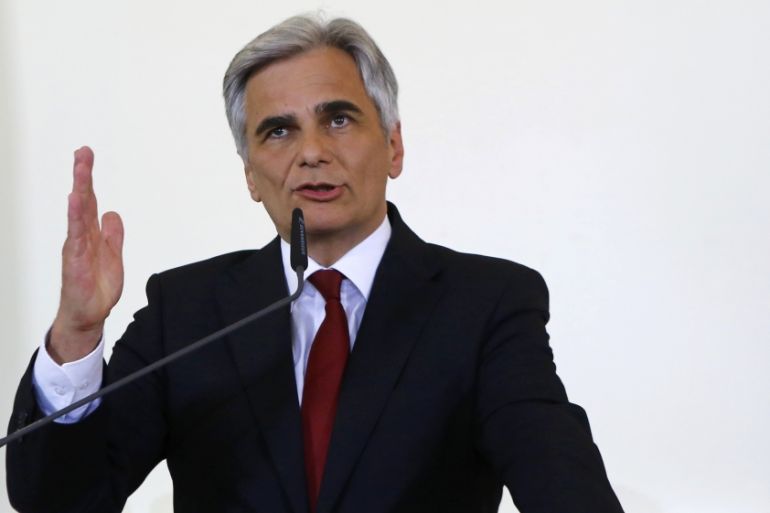Austria Chancellor Werner Faymann steps down
Faymann was under pressure from unionists and youth wing of his party after its defeat in presidential polls.

Austrian Chancellor Werner Faymann has stepped down after his party suffered a defeat in presidential polls last month that eroded support for him.
He resigned as leader of the centrist coalition government and as head of his Social Democratic Party (SPO), a spokeswoman said on Monday, after serving for almost eight years.
Keep reading
list of 4 itemsThe Take: What would a third Modi term mean for India?
Full jury panel seated on third day of Trump’s New York hush-money trial
Jacob Zuma’s nine lives: How South Africa’s ex-president keeps coming back
Al Jazeera’s Dominic Kane, reporting from Berlin, said the announcement of the resignation is important as Austria plays a key role in European politics regarding refugee crisis.
“The announcement of the austrian chancellor’s resignation may have come as a surprise to some but given the pressure Faymann was under, it was perhaps not surprising inside his own party,” Kane said.
“He’d been criticised after his party performed poorly in the first round of presidential elections, and on monday he said Austria needed a new start politically and economically and that he wasn’t the man to deliver it.”
Faymann had been under pressure from trade unionists and the youth wing of his party for his tough stance on asylum laws and for the party’s poor performance in the presidential election.
“To have a majority [in the party] is not enough,” the spokeswoman for Faymann quoted him as saying at a news conference.
She said she did not know what would happen to the coalition government.
“He has resigned from all functions,” she told the AFP news agency.
![The far-right Freedom Party has been regularly attracting more than 30 percent in opinion polls in Austria [EPA]](/wp-content/uploads/2016/04/2076b86b2e5a482db44789228285102f_18.jpeg)
The SPO, which rules Austria in a coalition with the centre-right People’s Party, suffered a major defeat last month in first-round voting for the next president when both parties scraped together only 23 percent.
The candidate for the far-right Freedom Party, Norbert Hofer, running on an anti-Islam and Eurosceptic platform, won more than a third of the votes.
The result has sent him into a runoff for the largely ceremonial role with a former Green Party leader on May 22.
The Freedom Party regularly attracts more than 30 percent in opinion polls, well ahead of the two ruling parties that have dominated post-World War II politics.
The next parliamentary elections are due to be held by 2018.
Austria got around 90,000 asylum requests in 2015 after large numbers of migrants and refugees, many fleeing conflicts in Syria, Iraq and Afghanistan, arrived in the Roman Catholic country of 8.5 million people.